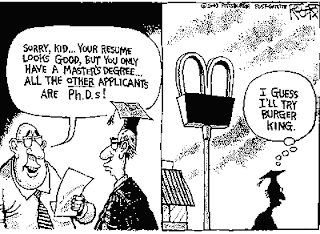I recommend reading this piece by Lynn Stuart Parramore, as it is among the most clear and concise descriptions of how the "401(k) revolution" (her words) is in the process of upending the retirement security of the vast majority of Americans, but also how it is a major driver of inequality. As she explains, the rise of the 401(k) added a tremendous amount of fuel to the inequality fire (for more, here's a useful Wonkblog summary of a much longer EPI report).
But Parramore makes a mistake very common to many liberals lamenting the rise of the 401(k). I'm not implying that she is in any way unique--this mistake is extremely common across the political spectrum, including liberals. That mistake occurs from beginning to end in the tale of the 401(k). Act one: 401(k)'s are born:
Thirty years ago, as laissez-faire fanaticism took hold of America, misguided policy-makers decided that do-it-yourself retirement plans, otherwise known as 401(k)s, would magically secure our financial future in the face of gyrating markets, economic crises, unpredictable life events, stagnant wages and rampant job insecurity.Note how the rise of the 401(k) is described as a mistake. Some "misguided" people made a mistake, and we're about to feel the very serious effects of that poor decision. The "misguided policy-makers" honestly thought this was a good idea--but good intentions do not make good policy, and their plan is about to backfire:
Instead of having predictable streams of income from traditional pensions, ordinary people with little financial expertise would suddenly transform themselves into financial gurus, putting money aside and managing complicated investments in tax-deferred accounts.Note how Parramore explains that "ordinary people" were expected to benefit from 401(k)'s. It's not that 401(k)'s were expected to help only the wealthy or only the investor class. They were designed to--and expected to--help everyone, including "ordinary people."
(By "traditional pensions," Parramore means defined benefit pensions. For those unacquainted, a defined benefit pension is an agreement that an employer will pay an employee a specific dollar amount each month from the date the employee retires to the date the employee dies. 401(k)'s are defined contribution, meaning the employer agrees to contribute a specific percentage (the "employer match") to a bizarre financial instrument, which is invested in the stock market and will pay out money to the employee once she retires. Of course, some employers don't actually offer an employer contribution--in other words, the "employer match" or "defined contribution" is zero.)
She succinctly describes how the entire scheme has already violently backfired:
Reality check: In 2007, the financial crisis destroyed America’s retirement fantasy. Jobs evaporated or were downsized. The stock market took a nosedive. Millions of Americans who had worked hard, straining to sock away a portion of their salary for 401(k)s, watched helplessly as a black cloud formed over their golden years. In October 2008, the Congressional Budget Office revealed that Americans had lost $2 trillion in just 15 months — money that will likely never be recovered.And, she gets close to the crux of the issue in concisely describing how 401(k)'s have enabled a further rise in inequality--
The report reveals that median retirement savings today stand at a paltry $44,000. But if you start looking at affluent America, the picture changes dramatically. A household at the 90 percentile of the retirement savings distribution had nearly 100 times more socked away for retirement than the median household. And the top 1 percent? Households at that lofty level had stashed more than $1.3 million in retirement account savings.--but ultimately misses the point. Liberals have the what and the how of 401(k)'s nailed down, but usually miss the why.
In a nutshell, the 401(k) revolution created a few big winners and turned most of us into losers.
Augmenting this understanding with the why of 401(k)'s is of utmost importance, because many liberals assume that pointing out the disastrous results of the 401(k) revolution is a key first step in changing policy. In their minds, if we could only prove that the policies that enabled the rise of 401(k)'s resulted in bad policy outcomes, our political system would be convinced that it's time to reverse course.
The problem is, the movement towards 401(k)'s has not been a mistake, and it certainly has not been a failure. It is going exactly according to plan. 401(k)'s indeed are a vastly inferior system for the vast majority of Americans, but 401(k)'s were not created to help ordinary people save for retirement. They were created and expanded for very different reasons. To the people who ushered in the 401(k) revolution, the retirement "nightmare" beginning to swallow recent American retirees has not been a nightmare at all. It has been an especially enriching and welcome development.
Remember as you're reading: defined contribution pensions are a vastly inferior model to defined benefit pensions. Defined benefit pensions can provide the same retirement security as a defined contribution pension, for 45% less cost. Additionally, research argues that putting money in a 401(k) is generally harmful for low income workers. Whatever the reason to switch from defined benefit to 401(k), it should be a really good reason in order to make up for the enormously higher cost and other weaknesses. You be the judge:





















